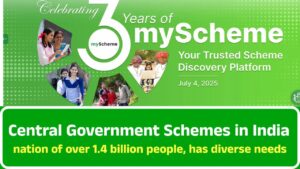Central Government Schemes in India
1. Introduction
India, a nation of over 1.4 billion people, has diverse needs—ranging from agriculture, healthcare, and education to infrastructure, employment, and digital connectivity. To address these needs, the Central Government of India has launched numerous schemes aimed at improving quality of life, empowering vulnerable populations, and ensuring inclusive growth.
These schemes are broadly classified into welfare schemes, development initiatives, and subsidy-based programs.

2. Why Government Schemes Are Important
Government schemes are tools for:
- Poverty alleviation
- Social upliftment
- Access to education and healthcare
- Support for farmers and MSMEs
- Women empowerment
- Youth employment and skill-building
They create a safety net and provide structured support where the private sector often falls short.
3. How to Access Government Schemes
You can access schemes via:
- Online portals like myScheme
- State-level department websites
- CSCs (Common Service Centres)
- Gram Panchayats and urban municipalities
Most schemes are now digital-first, simplifying the application process.
4. myScheme Portal – One-Stop Access
The myScheme portal is a flagship initiative by the Indian government to simplify access.
Website: https://www.myscheme.gov.in
Features:
- Personalized scheme recommendations
- Filters based on gender, caste, age, income
- Central + State schemes
- English and Hindi interface
5. Top Central Government Schemes by Category
a. Financial Inclusion
- Pradhan Mantri Jan Dhan Yojana (PMJDY)
- Zero-balance savings account
- Free RuPay debit card
- Overdraft facility
- Direct Benefit Transfer (DBT)
- Transfers subsidies directly to beneficiary’s bank account
b. Health and Insurance
- Ayushman Bharat (PM-JAY)
- ₹5 lakh insurance per family per year
- Covers over 50 crore people
- Pradhan Mantri Suraksha Bima Yojana (PMSBY)
- ₹2 lakh accidental insurance for ₹12/year
- Pradhan Mantri Jeevan Jyoti Bima Yojana (PMJJBY)
- ₹2 lakh life cover for ₹330/year
c. Education and Scholarships
- National Scholarship Portal (NSP)
- https://scholarships.gov.in
- Pre-Matric, Post-Matric, and Merit scholarships
- AICTE Saksham & Pragati
- Support for differently-abled and girl students
- PM-USP (Prime Minister’s Scholarship Scheme)
- For children of ex-servicemen and police martyrs
d. Agriculture and Farmers
- PM-KISAN Samman Nidhi
- ₹6,000/year to eligible farmers
- https://pmkisan.gov.in
- PM Fasal Bima Yojana (PMFBY)
- Crop insurance for unpredictable losses
- Kisan Credit Card (KCC)
- Loans up to ₹3 lakh at subsidized rates
e. Women Empowerment
- Mahila Samman Saving Scheme (MSSC)
- Fixed deposit scheme at higher interest rate
- Support to Training and Employment Programme (STEP)
- Maternity Benefit Programme (PMMVY)
- ₹6,000 for pregnant women & lactating mothers
f. Housing and Infrastructure
- PMAY (Urban & Gramin)
- Interest subsidies for housing loans
- Financial aid for home construction
- Ujjwala Yojana
- Free LPG connections to BPL women
g. Employment and Skill Development
- Pradhan Mantri Kaushal Vikas Yojana (PMKVY)
- Free skill training programs
- Certification and job placement support
- MGNREGA
- Guaranteed 100 days employment in rural India
- PMEGP (Employment Generation Program)
- Subsidized loans for micro-enterprises
h. Social Welfare and Pensions
- National Social Assistance Programme (NSAP)
- Old age, widow, and disability pensions
- Atal Pension Yojana (APY)
- Monthly pension post 60 years
- ₹1,000–₹5,000/month depending on contribution
i. Startup and MSME Support
- Startup India Initiative
- Funding, mentorship, tax breaks
- Stand-Up India Scheme
- Loans for SC/ST and women entrepreneurs
- MUDRA Loans
- Loans up to ₹10 lakh to micro-enterprises
j. Youth and Students
- Digital India Internship Scheme
- For graduate/post-grad students
- NIPUN Bharat Mission
- Focus on foundational literacy & numeracy
- Fit India Movement
- Health and wellness campaigns for youth
6. Digital India & e-Governance Initiatives
- DigiLocker: Secure cloud-based document storage
- UMANG App: Access to 100+ government services
- BHIM App: UPI-based digital payments
- e-SHRAM: National database for unorganized workers
7. How to Apply – Step-by-Step
- Visit official portal (e.g., myScheme, PM-KISAN)
- Register using Aadhaar and mobile number
- Upload required documents
- Submit the application
- Track application status online
8. 📑 Documents Required (General List)
- Aadhaar Card
- PAN Card
- Income Certificate
- Domicile Certificate
- Caste Certificate (if applicable)
- Bank Passbook
- Photograph
9. ⚠️ Common Challenges & Solutions
| Challenge | Solution |
|---|---|
| Delayed approvals | Use grievance redressal portal |
| Aadhaar linking issues | Visit nearby CSC or Aadhaar Seva Kendra |
| Lack of awareness | Use myScheme to discover schemes |
| Language barrier | Use Hindi/vernacular interfaces |
10. 🌟 Success Stories
- Rani from Jharkhand used PMEGP loan to start her tailoring business.
- Farmer Gopal in Maharashtra recovered crop losses with PMFBY.
- Meena, a homemaker, got free LPG under Ujjwala and later joined SHG to earn.
11. ❓ Frequently Asked Questions (FAQs)
Q1. Are these schemes free?
Most welfare schemes are either free or highly subsidized.
Q2. Can I apply offline?
Yes, most schemes allow both offline and online modes.
Q3. Is Aadhaar mandatory?
Yes, for most DBT and financial schemes.
Q4. What if my application is rejected?
You can appeal or correct mistakes and reapply.
12. ✅ Conclusion
India’s central government schemes are a lifeline for millions, providing everything from education and housing to employment and digital access. Platforms like myScheme are revolutionizing the way citizens discover and apply for them.
